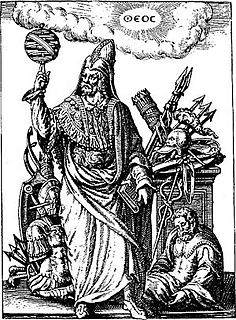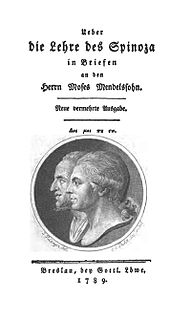 W
W17th-century philosophy is generally regarded as seeing the start of modern philosophy, and the shaking off of the medieval approach, especially scholasticism. It succeeded the Renaissance and preceded the Age of Enlightenment. It is often considered to be part of early modern philosophy.
 W
WIn the 19th century, the philosophers of the 18th-century Enlightenment began to have a dramatic effect on subsequent developments in philosophy. In particular, the works of Immanuel Kant gave rise to a new generation of German philosophers and began to see wider recognition internationally. Also, in a reaction to the Enlightenment, a movement called Romanticism began to develop towards the end of the 18th century. Key ideas that sparked changes in philosophy were the fast progress of science, including evolution, most notably postulated by Charles Darwin and Jean-Baptiste Lamarck, and theories regarding what is today called emergent order, such as the free market of Adam Smith within nation states. Pressures for egalitarianism, and more rapid change culminated in a period of revolution and turbulence that would see philosophy change as well.
 W
WThe Age of Enlightenment was an intellectual and philosophical movement that dominated the world of ideas in Europe during the 17th and 18th centuries. The Enlightenment included a range of ideas centered on the pursuit of happiness, sovereignty of reason and the evidence of the senses as the primary sources of knowledge and advanced ideals such as liberty, progress, toleration, fraternity, constitutional government and separation of church and state.
 W
WAnalytic philosophy is a branch and tradition of philosophy using analysis which is popular in the Western World and particularly the Anglosphere, which began around the turn of the 20th century in the contemporary era and continues today. In the United Kingdom, United States, Canada, Australia, New Zealand and Scandinavia, the majority of university philosophy departments today identify themselves as "analytic" departments.
 W
WCogito, ergo sum is a philosophical statement that was made in Latin by René Descartes, usually translated into English as "I think, therefore I am". The phrase originally appeared in French as je pense, donc je suis in his Discourse on the Method, so as to reach a wider audience than Latin would have allowed. It appeared in Latin in his later Principles of Philosophy. As Descartes explained it, "we cannot doubt of our existence while we doubt." A fuller version, articulated by Antoine Léonard Thomas, aptly captures Descartes's intent: dubito, ergo cogito, ergo sum. The dictum is also sometimes referred to as the cogito.
 W
WThe Copernican Question: Prognostication, Skepticism, and Celestial Order is a 704-page book written by Robert S. Westman and published by University of California Press in 2011 and in 2020 (paperback). The book is a broad historical overview of Europe's astronomical and astrological culture leading to Copernicus’s De revolutionibus and follows the scholarly debates that took place roughly over three generations after Copernicus.
 W
WThe Discourse on the Eighth and Ninth is an ancient Hermetic treatise. It is one of the three short texts attributed to the legendary Hellenistic figure Hermes Trismegistus that were discovered among the Nag Hammadi findings.
 W
WFirst Generation of Intellectual movements in Iran or Iranian Enlightenment was a period in the mid-19th- to early-20th- century in Iran, which was accompanied by new ideas in the traditional Iranian society. During the rule of the Qajar dynasty, and especially after the defeat of Iran, in the war with the Russian Empire, due to cultural exchanges, new ideas were formed among the educated class of Iran. This military defeat also encouraged the Qajar commanders to overcome the backwardness. The establishment of Dar ul-Fonun, the first modern university in Iran and the arrival of foreign professors, caused the thoughts of European thinkers to enter Iran, followed by the first signs of enlightenment and intellectual movements in Iran.
 W
WThe First Moderns: Profiles in the Origins of Twentieth-Century Thought is a book on Modernism by historian William Everdell, published in 1997 by the University of Chicago Press. A New York Times Notable Book of 1997, and included by the New York Public Library on its list of "25 Books to Remember from 1997," The First Moderns suggests that "the heart of Modernism is the postulate of ontological discontinuity."
 W
WThe I Ching or Yi Jing, usually translated as Book of Changes or Classic of Changes, is an ancient Chinese divination text and among the oldest of the Chinese classics. Originally a divination manual in the Western Zhou period (1000–750 BC), over the course of the Warring States period and early imperial period (500–200 BC) it was transformed into a cosmological text with a series of philosophical commentaries known as the "Ten Wings". After becoming part of the Five Classics in the 2nd century BC, the I Ching was the subject of scholarly commentary and the basis for divination practice for centuries across the Far East, and eventually took on an influential role in Western understanding of Eastern thought.
 W
WKantian ethics refers to a deontological ethical theory developed by German philosopher Immanuel Kant that is based on the notion that: "It is impossible to think of anything at all in the world, or indeed even beyond it, that could be considered good without limitation except a good will." The theory was developed as a result of Enlightenment rationalism, stating that an action can only be good if its maxim—the principle behind it—is duty to the moral law, and arises from a sense of duty in the actor.
 W
WThe linguistic turn was a major development in Western philosophy during the early 20th century, the most important characteristic of which is the focusing of philosophy and the other humanities primarily on the relations between language, language users, and the world.
 W
WThe mean speed theorem, also known as the Merton rule of uniform acceleration, was discovered in the 14th century by the Oxford Calculators of Merton College, and was proved by Nicole Oresme. It states that a uniformly accelerated body travels the same distance as a body with uniform speed whose speed is half the final velocity of the accelerated body.
 W
WThe mind–body problem is a debate concerning the relationship between thought and consciousness in the human mind, and the brain as part of the physical body. It is distinct from the question of how mind and body function chemically and physiologically, as that question presupposes an interactionist account of mind–body relations. This question arises when mind and body are considered as distinct, based on the premise that the mind and the body are fundamentally different in nature.
 W
WThe Modern Greek Enlightenment was the Greek expression of the Age of Enlightenment.
 W
WNatural philosophy or philosophy of nature was the philosophical study of nature and the physical universe that was dominant before the development of modern science. It is considered to be the precursor of natural science.
 W
WThe Oxford Calculators were a group of 14th-century thinkers, almost all associated with Merton College, Oxford; for this reason they were dubbed "The Merton School". These men took a strikingly logical and mathematical approach to philosophical problems. The key "calculators", writing in the second quarter of the 14th century, were Thomas Bradwardine, William Heytesbury, Richard Swineshead and John Dumbleton. These men built on the slightly earlier work of Walter Burley and Gerard of Brussels.
 W
WThe pantheism controversy refers to the 1780s debates in German intellectual life that discussed the merits of Spinoza's "pantheistic" conception of God. What became a wider cultural debate in German society started as a personal disagreement between Friedrich Heinrich Jacobi and Moses Mendelssohn over their understanding of Gotthold Ephraim Lessing's Spinozist beliefs. The difference of opinion became a wider public controversy when, in 1785, Jacobi published his correspondence with Mendelssohn. This started a series of public discussions on the matter.
 W
WPositivism is a philosophical theory that states that "genuine" knowledge is exclusively derived from experience of natural phenomena and their properties and relations. Thus, information derived from sensory experience, as interpreted through reason and logic, forms the exclusive source of all certain knowledge. Positivism therefore holds that all genuine knowledge is a posteriori knowledge.
 W
WPostpositivism or postempiricism is a metatheoretical stance that critiques and amends positivism and has impacted theories and practices across philosophy, social sciences, and various models of scientific inquiry. While positivists emphasize independence between the researcher and the researched person, postpositivists argue that theories, hypotheses, background knowledge and values of the researcher can influence what is observed. Postpositivists pursue objectivity by recognizing the possible effects of biases. While positivists emphasize quantitative methods, postpositivists consider both quantitative and qualitative methods to be valid approaches.
 W
WPragmatic ethics is a theory of normative philosophical ethics and meta-ethics. Ethical pragmatists such as John Dewey believe that some societies have progressed morally in much the way they have attained progress in science. Scientists can pursue inquiry into the truth of a hypothesis and accept the hypothesis, in the sense that they act as though the hypothesis were true; nonetheless, they think that future generations can advance science, and thus future generations can refine or replace their accepted hypotheses. Similarly, ethical pragmatists think that norms, principles, and moral criteria are likely to be improved as a result of inquiry.
 W
WRepresentative Men is a collection of seven lectures by Ralph Waldo Emerson, published as a book of essays in 1850. The first essay discusses the role played by "great men" in society, and the remaining six each extol the virtues of one of six men deemed by Emerson to be great:Plato Emanuel Swedenborg Michel de Montaigne William Shakespeare Napoleon Johann Wolfgang von Goethe
 W
WThe Scottish Enlightenment was the period in 18th- and early-19th-century Scotland characterised by an outpouring of intellectual and scientific accomplishments. By the eighteenth century, Scotland had a network of parish schools in the Lowlands and four universities. The Enlightenment culture was based on close readings of new books, and intense discussions took place daily at such intellectual gathering places in Edinburgh as The Select Society and, later, The Poker Club, as well as within Scotland's ancient universities.
 W
WThe Seven Sages or Seven Wise Men was the title given by classical Greek tradition to seven philosophers, statesmen, and law-givers of the 6th century BC who were renowned for their wisdom.
 W
WStoicism is a school of Hellenistic philosophy founded by Zeno of Citium in Athens in the early 3rd century BC. It is a philosophy of personal ethics informed by its system of logic and its views on the natural world. According to its teachings, as social beings, the path to eudaimonia is found in accepting the moment as it presents itself, by not allowing oneself to be controlled by the desire for pleasure or by the fear of pain, by using one's mind to understand the world and to do one's part in nature's plan, and by working together and treating others fairly and justly.
 W
WThe questions pertaining to "why there is anything at all?", or, "why there is something rather than nothing" has been raised or commented on by philosophers including Gottfried Wilhelm Leibniz, Ludwig Wittgenstein, and Martin Heidegger – who called it "the fundamental question of metaphysics".
 W
WWildness, in its literal sense, is the quality of being wild or untamed. Beyond this, it has been defined as a quality produced in nature, as that which emerges from a forest, and as a level of achievement in nature. More recently, it has been defined as "a quality of interactive processing between organism and nature where the realities of base natures are met, allowing the construction of durable systems". A wilderness is a place where wildness occurs.
 W
WThe term "world riddle" or "world-riddle" has been associated, for over 100 years, with Friedrich Nietzsche and with the biologist-philosopher Ernst Haeckel, who, as a professor of zoology at the University of Jena, wrote the book Die Welträthsel in 1895–1899, in modern spelling Die Welträtsel, with the English version published under the title The Riddle of the Universe, 1901.